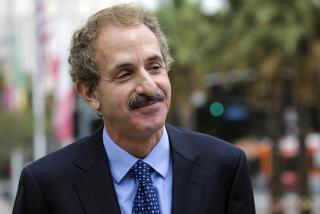Compton Mayor’s Son to Face Trial on Falsifying Court Evidence, Lying
- Share via
COMPTON — Attorney Walter R. Tucker III testified last week that he was coerced into confessing that he falsified evidence and lied to cover it up while handling a drug case in 1986 as a deputy district attorney.
Tucker, the 30-year-old son of Compton Mayor Walter R. Tucker, was subsequently fired from the prosecutors’ office and now faces charges based largely on the confession. The lawyer has pleaded innocent to two felony counts of falsifying evidence and one misdemeanor count of lying to a judge.
If convicted, he could receive up to four years in jail and face disbarment.
Despite the younger Tucker’s claim that the case against him is tainted, Municipal Court Judge Lourdes G. Baird ruled after a preliminary hearing Wednesday in Los Angeles that there is sufficient evidence to hold him for trial.
State Prosecutor Called In
Because Tucker is a former employee, the Los Angeles County district attorney’s office disqualified itself from the proceedings. So, the case is being directed by the state attorney general’s office.
As a third-year prosecutor, Tucker had been assigned to press a drug case against five defendants in the fall of 1986, Deputy Atty. Gen. Charlene Honnaka said during last week’s hearing.
Honnaka told the court that Tucker ordered a district attorney photographer on Oct. 8 to take pictures of a house where drug sales were thought to have taken place. The photographer, Susan Monroe, testified Wednesday that she finished the job that same day and gave the photos to Tucker.
As a prosecutor, Tucker was required to present to defense attorneys any evidence that he was going to use in court as soon as that evidence became known to him.
Photos Were Held
Tucker, however, failed to turn over the photographs--showing the outside of a house where drug deals were alleged to have occurred--until Nov. 5, 1986, the day he introduced them in court, according to trial transcripts.
Monroe said that the next day Tucker came to her and asked for the paper work she had filled out, stating when the photographs had been taken, so he could photocopy them.
“When he returned the form, I asked him what he needed it for,” Monroe testified. “He was reluctant to tell me but I was persistent. He told me that he neglected to give the photos to the defense during discovery. He showed me that he changed the date (on the paper work) from Oct. 8 to Oct. 28. . . . He said he would present the document if asked (in court about the date the photos were taken) in order ‘to cover my ass.”’
On Nov. 8, Superior Court Judge Kathleen Parker, who was conducting the drug trial, asked Tucker when the photographs had been made. Tucker told her that he was unsure but he thought they had been taken around Oct. 28, court transcripts show.
Photographer Wrote Memo
Monroe said about that time she reported Tucker’s comments to her in a memo that eventually reached his supervisor, Deputy Dist. Atty. Phillip Mueller.
Mueller testified that when he confronted Tucker in a conversation on Nov. 12, the lawyer admitted that he altered the document. Mueller said he urged Tucker to go to Judge Parker and confess, which Tucker did.
(The drug case defendants were eventually acquited, but not because of Tucker’s alleged misconduct, a district attorney spokesman has said.)
Tucker’s defense lawyer, William L. McKinney, tried unsuccessfully to get the confession thrown out. He charged that Tucker had been made to fear he would be terminated and that Mueller had not advised Tucker of his Constitutional right to remain silent and avoid self-incrimination.
‘A Strong Implication’
Tucker testified in his own defense that Mueller gave him “a strong implication” that he would be fired if he did not confess.
“Mr. Mueller said, ‘If you do not go down and tell (the court) what happened, it will not sit well,’ ” Tucker said. “I knew what that meant.”
Tucker said under cross-examination by Honnaka that when he confessed he believed that Mueller was conducting an internal investigation.
“I did not know that the altering of that document was a crime,” Tucker said.
But Judge Baird rejected the defense arguments. A trial date in Superior Court is yet to be scheduled.
More to Read
Sign up for Essential California
The most important California stories and recommendations in your inbox every morning.
You may occasionally receive promotional content from the Los Angeles Times.










